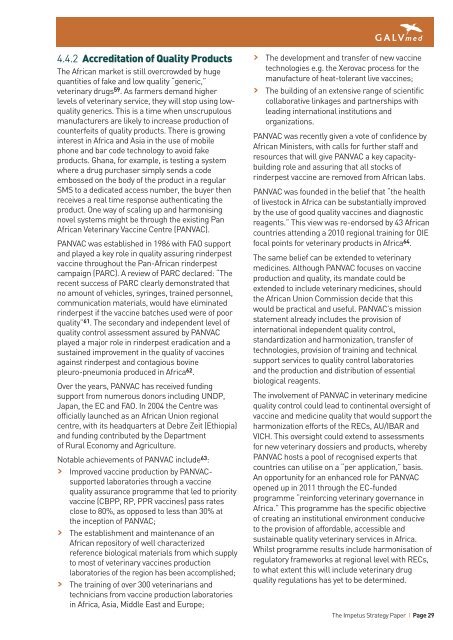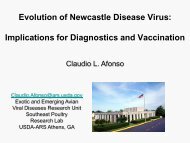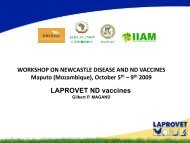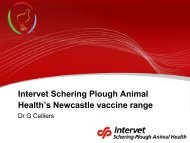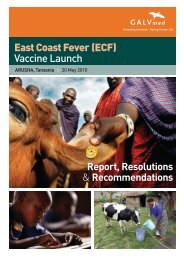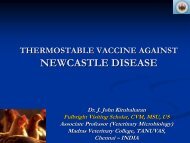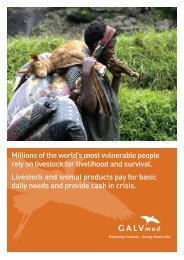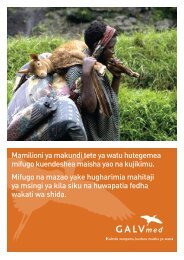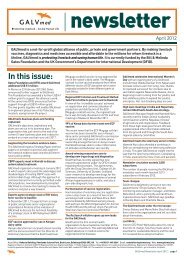A Path to Prosperity New Directions for African Livestock
GALVmed Impetus Strategy Paper
GALVmed Impetus Strategy Paper
- No tags were found...
Create successful ePaper yourself
Turn your PDF publications into a flip-book with our unique Google optimized e-Paper software.
4.4.2 Accreditation of Quality Products<br />
The <strong>African</strong> market is still overcrowded by huge<br />
quantities of fake and low quality “generic,”<br />
veterinary drugs 59 . As farmers demand higher<br />
levels of veterinary service, they will s<strong>to</strong>p using lowquality<br />
generics. This is a time when unscrupulous<br />
manufacturers are likely <strong>to</strong> increase production of<br />
counterfeits of quality products. There is growing<br />
interest in Africa and Asia in the use of mobile<br />
phone and bar code technology <strong>to</strong> avoid fake<br />
products. Ghana, <strong>for</strong> example, is testing a system<br />
where a drug purchaser simply sends a code<br />
embossed on the body of the product in a regular<br />
SMS <strong>to</strong> a dedicated access number, the buyer then<br />
receives a real time response authenticating the<br />
product. One way of scaling up and harmonising<br />
novel systems might be through the existing Pan<br />
<strong>African</strong> Veterinary Vaccine Centre (PANVAC).<br />
PANVAC was established in 1986 with FAO support<br />
and played a key role in quality assuring rinderpest<br />
vaccine throughout the Pan-<strong>African</strong> rinderpest<br />
campaign (PARC). A review of PARC declared: “The<br />
recent success of PARC clearly demonstrated that<br />
no amount of vehicles, syringes, trained personnel,<br />
communication materials, would have eliminated<br />
rinderpest if the vaccine batches used were of poor<br />
quality” 61 . The secondary and independent level of<br />
quality control assessment assured by PANVAC<br />
played a major role in rinderpest eradication and a<br />
sustained improvement in the quality of vaccines<br />
against rinderpest and contagious bovine<br />
pleuro-pneumonia produced in Africa 62 .<br />
Over the years, PANVAC has received funding<br />
support from numerous donors including UNDP,<br />
Japan, the EC and FAO. In 2004 the Centre was<br />
officially launched as an <strong>African</strong> Union regional<br />
centre, with its headquarters at Debre Zeit (Ethiopia)<br />
and funding contributed by the Department<br />
of Rural Economy and Agriculture.<br />
Notable achievements of PANVAC include 63 :<br />
> Improved vaccine production by PANVACsupported<br />
labora<strong>to</strong>ries through a vaccine<br />
quality assurance programme that led <strong>to</strong> priority<br />
vaccine (CBPP, RP, PPR vaccines) pass rates<br />
close <strong>to</strong> 80%, as opposed <strong>to</strong> less than 30% at<br />
the inception of PANVAC;<br />
> The establishment and maintenance of an<br />
<strong>African</strong> reposi<strong>to</strong>ry of well characterized<br />
reference biological materials from which supply<br />
<strong>to</strong> most of veterinary vaccines production<br />
labora<strong>to</strong>ries of the region has been accomplished;<br />
> The training of over 300 veterinarians and<br />
technicians from vaccine production labora<strong>to</strong>ries<br />
in Africa, Asia, Middle East and Europe;<br />
> The development and transfer of new vaccine<br />
technologies e.g. the Xerovac process <strong>for</strong> the<br />
manufacture of heat-<strong>to</strong>lerant live vaccines;<br />
> The building of an extensive range of scientific<br />
collaborative linkages and partnerships with<br />
leading international institutions and<br />
organizations.<br />
PANVAC was recently given a vote of confidence by<br />
<strong>African</strong> Ministers, with calls <strong>for</strong> further staff and<br />
resources that will give PANVAC a key capacitybuilding<br />
role and assuring that all s<strong>to</strong>cks of<br />
rinderpest vaccine are removed from <strong>African</strong> labs.<br />
PANVAC was founded in the belief that “the health<br />
of lives<strong>to</strong>ck in Africa can be substantially improved<br />
by the use of good quality vaccines and diagnostic<br />
reagents.” This view was re-endorsed by 43 <strong>African</strong><br />
countries attending a 2010 regional training <strong>for</strong> OIE<br />
focal points <strong>for</strong> veterinary products in Africa 64 .<br />
The same belief can be extended <strong>to</strong> veterinary<br />
medicines. Although PANVAC focuses on vaccine<br />
production and quality, its mandate could be<br />
extended <strong>to</strong> include veterinary medicines, should<br />
the <strong>African</strong> Union Commission decide that this<br />
would be practical and useful. PANVAC’s mission<br />
statement already includes the provision of<br />
international independent quality control,<br />
standardization and harmonization, transfer of<br />
technologies, provision of training and technical<br />
support services <strong>to</strong> quality control labora<strong>to</strong>ries<br />
and the production and distribution of essential<br />
biological reagents.<br />
The involvement of PANVAC in veterinary medicine<br />
quality control could lead <strong>to</strong> continental oversight of<br />
vaccine and medicine quality that would support the<br />
harmonization ef<strong>for</strong>ts of the RECs, AU/IBAR and<br />
VICH. This oversight could extend <strong>to</strong> assessments<br />
<strong>for</strong> new veterinary dossiers and products, whereby<br />
PANVAC hosts a pool of recognised experts that<br />
countries can utilise on a “per application,” basis.<br />
An opportunity <strong>for</strong> an enhanced role <strong>for</strong> PANVAC<br />
opened up in 2011 through the EC-funded<br />
programme “rein<strong>for</strong>cing veterinary governance in<br />
Africa.” This programme has the specific objective<br />
of creating an institutional environment conducive<br />
<strong>to</strong> the provision of af<strong>for</strong>dable, accessible and<br />
sustainable quality veterinary services in Africa.<br />
Whilst programme results include harmonisation of<br />
regula<strong>to</strong>ry frameworks at regional level with RECs,<br />
<strong>to</strong> what extent this will include veterinary drug<br />
quality regulations has yet <strong>to</strong> be determined.<br />
The Impetus Strategy Paper I Page 29


